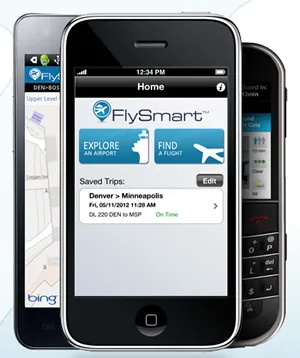
More passengers use technology for travel than ever before
Oct 02, 2014

In recent years, the travel industry has witnessed a significant surge in the use of technology by passengers. More travelers are relying on mobile apps for booking flights, managing itineraries, and navigating unfamiliar destinations. The convenience of digital boarding passes and real-time updates enhances the travel experience, allowing for greater flexibility and efficiency. Social media platforms play a vital role in sharing travel experiences and seeking recommendations. Additionally, innovations like virtual reality and augmented reality are beginning to reshape how people plan and experience their journeys. This trend reflects a broader shift towards a more tech-savvy and connected approach to travel.
In recent years, the travel industry has undergone a significant transformation, largely driven by technological advancements. More passengers use technology for travel than ever before, enhancing their overall experience. From booking flights to navigating new destinations, travelers are increasingly relying on digital tools to streamline their journeys. This article delves into the various ways technology has reshaped the travel landscape and highlights the impact on both travelers and the industry.
The Rise of Mobile Apps
One of the most notable trends is the increase in the use of mobile apps for travel. Apps like Skyscanner, Expedia, and Airbnb have made it easier for travelers to plan their trips. According to a recent survey, over 70% of travelers now use mobile devices to book accommodations and manage itineraries. The convenience of having all travel-related information in one place is a game changer.
Online Booking Systems
Traditional travel agencies are seeing a decline in foot traffic as more passengers opt for online booking systems. The flexibility and ease of comparing prices online contribute to this trend. A chart illustrates the shift in booking methods over the past five years:
| Year | Online Bookings (%) | In-Person Bookings (%) |
|---|---|---|
| 2018 | 55 | 45 |
| 2019 | 60 | 40 |
| 2020 | 75 | 25 |
| 2021 | 80 | 20 |
| 2022 | 85 | 15 |
This chart clearly indicates that the trend towards online bookings is only expected to grow, reflecting a shift in consumer behavior towards technology in travel.
Smart Travel Gadgets
Travelers are also embracing smart gadgets that enhance their travel experience. Devices such as portable Wi-Fi hotspots, noise-canceling headphones, and smart luggage are becoming increasingly popular. These gadgets not only improve convenience but also provide travelers with peace of mind, knowing they can stay connected regardless of their location. The integration of technology into travel gear underscores how essential these tools have become for modern travelers.
Social Media Influence
Social media platforms play a crucial role in travel decisions. Many passengers rely on Instagram, Facebook, and Pinterest for travel inspiration and recommendations. A recent study indicated that 85% of travelers use social media to research destinations and activities. The influence of travel influencers and user-generated content cannot be overstated, as they often sway public opinion and encourage more travelers to explore new locations.
Personalized Travel Experiences
More passengers are also benefiting from personalized travel experiences thanks to advanced algorithms and data analytics. Companies are using customer data to tailor recommendations based on past behavior and preferences. Whether it’s suggesting a unique dining experience or a hidden gem of a destination, technology enables a level of personalization that was previously unattainable.
Virtual Reality and Augmented Reality
Virtual Reality (VR) and Augmented Reality (AR) technologies are paving the way for innovative travel experiences. Travel companies are utilizing VR to offer virtual tours of destinations, allowing travelers to explore before they book. AR apps can enhance the travel experience by providing real-time information about landmarks and attractions through smartphone cameras. As these technologies continue to evolve, they will likely become staples in the travel planning process.
Impact on Customer Service
Technology has also transformed customer service in the travel industry. Chatbots and AI-driven support systems allow companies to provide 24/7 assistance to travelers, making it easier to resolve issues promptly. This shift has led to increased customer satisfaction, as travelers appreciate the immediate assistance provided by these digital tools. Additionally, companies are leveraging customer feedback gathered through technology to continuously improve their services.
Conclusion
In conclusion, the integration of technology into the travel experience has revolutionized how passengers plan and execute their journeys. More passengers use technology for travel than ever before, driven by the convenience of mobile apps, online booking systems, and personalized experiences. As the industry continues to evolve, embracing these technological advancements will be crucial for both travelers and service providers. The future of travel is undoubtedly intertwined with technology, promising exciting developments ahead.
Related Articles

Explore Thailand: The Best Islands to Visit for Paradise, Adventure, and Relaxation

The Ultimate Guide to the Best Islands in Thailand for Your Next Getaway

Do babies need passports? How to get a passport for a newborn

How to get a U.S. passport fast: here’s how to expedite the process

What is Mobile Passport Control: 5 reasons why you should use it

SENTRI vs. Global Entry: A detailed guide

Do you need a passport to go to the Bahamas? Let’s find out

Do you need a passport to go to Mexico? A detailed guide

Do you need a passport to go to Canada? We got the answer

Do You Need a Passport for a Cruise: An Essential Travel Guide

Booster Seat Requirements: All the Rules to Follow in Your Rental Car

What Are the World’s Most Powerful Passports, and How Does Yours Rank?

How to Take a Passport Photo at Home: A Helpful Guide

You've got to have heart! Southwest's new livery

Your opinion: Should water be free on low cost carriers?

Young women bolder than guys as solo travellers
